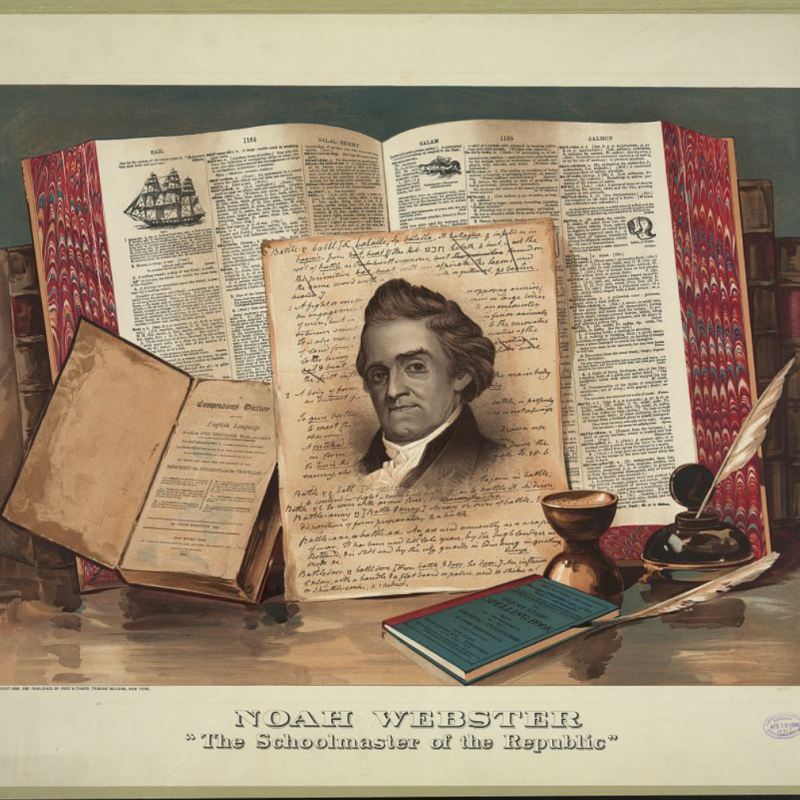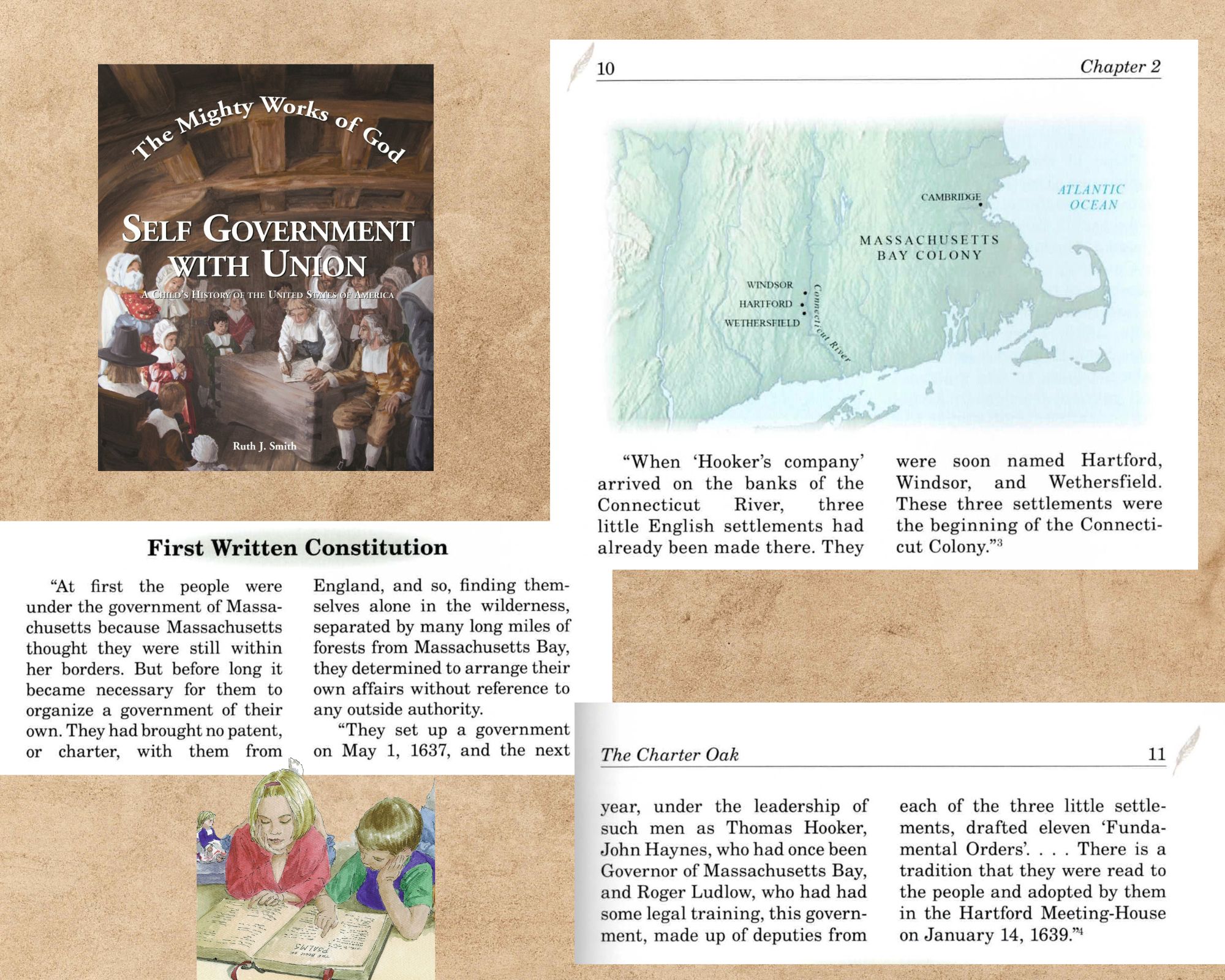October 16, 1758 – May 28, 1843
Do you recognize the importance of words and their meanings? Noah Webster certainly did!
As we honor Noah Webster’s life and legacy, we reflect with gratitude on the remarkable dictionary we use today to guide our understanding of American character, government, education, and liberty.

Home and Family
Noah’s mother was a descendant of William Bradford, governor of the Plymouth Colony for over thirty years.
His father was a descendant of John Webster, one of Hartford’s earliest settlers and leaders who in time served as the governor of Connecticut. (See The Mighty Works of God: Self Government with Union to learn more about Connecticut’s history of local self government.)
The founders in Plymouth, Connecticut, and nearby New England colonies established our nation’s principle and practice of local self government through the Mayflower Compact and the Fundamental Orders of Connecticut. Local self government, an extension of individual self government, was practiced for 150 years and gave us the foundation for both our Declaration of Independence and our U.S. Constitution.

A Look Inside the Historic Noah Webster House
Noah Webster’s Education
In the spirit of New England character, Noah began early in life to pursue his God-given interests. Determined to become a lawyer, and with the support of his family, he worked hard to earn his education.
In 1772 – Noah began studying under the local clergyman, Rev. Nathan Perkins, D.D.
In 1774, at the age of 16 – Noah entered Yale College
In 1778 – Noah Webster graduated from Yale College
Upon graduation, young Mr. Webster found a position as a schoolteacher. He continued to study law on his own and was admitted to the bar in 1781.

Contributions
With the ongoing struggle for American independence, opportunities to practice law were limited. So, Webster focused his efforts on American education. By 1783 he published the First Part of a Grammatical Institute of the English Language. We remember this book as Noah Webster’s Blue-Backed Speller, used to teach American children in homes and classrooms for over 100 years. An estimated 100 million copies were published.
The Speller was immediately followed by a Grammar and a Reader. Through these books, Webster influenced the education of a nation.
Always energetic and zealous for the public good, Webster engaged in public affairs: writing articles and pamphlets, speaking to state legislatures, meeting with public officials, and publishing a newspaper. His writings helped to inform and educate the American people. Writing about the newly-proposed United States Constitution, Webster explained:
“The constitution defines the powers of Congress; and every power not expressly delegated to that body, remains in the several state-legislatures. The sovereignty and the republican form of government of each state is guaranteed by the constitution; and the bounds of jurisdiction between the federal and respective state governments, are marked with precision.”
-N. Webster, 1787, An Examination into the Leading Principles of the Federal Constitution
Webster’s efforts to work for liberty and the protection of private property included advocating for copyright laws in the early days of the republic.
Concerned about yellow fever, he conducted and published research on Epidemic and Pestilential Disease.
Interested in a topic of consideration at the time, he researched weather over a period of ten years. His dissertation On the Supposed Change in the Temperature of Winter was read in the Connecticut Academy of Arts and Sciences in 1799.
Webster wrote and published additional works including a History of the United States, Value of the Bible and Excellence of the Christian Religion, and more.
What did Noah Webster state concerning the authority of the Scripture?
In 1801 Webster began what would become his most influential publication. For more than twenty years, he researched 70,000 words in twenty-six languages, documenting their etymology, defining their meaning, and illustrating their usage.
Completed in 1825, and published in 1828, his American Dictionary of the English Language is a national treasure. It provides a resource for study and reflection, allowing us to reason and draw conclusions from a proper foundation.

Webster’s original 1828 Dictionary enables us to understand the distinct meanings of words as intended by our founders and recorded in our nation’s original documents.
Webster himself expressed the need for a distinctive American dictionary.
“As an independent nation, our honor requires us to have a system of our own, in language as well as government.” N. Webster, 1789, Dissertations on the English Language
“Language is the expression of ideas; and if the people of one country can not preserve an identity of ideas, they can not retain an identity of language….
“But the principal differences between the people of this country and of all others, arise from different forms of government, different laws, institutions, and customs….
“In many cases, the nature of our governments and our civil institutions, requires an appropriate language in the definition of words.” N. Webster, New Haven 1828
Webster closed the preface to his Dictionary, the great work of his life, with these words:
“I present it to my fellow citizens, not with frigid indifference, but with my ardent wishes for their improvement and their happiness; and for the continued increase of the wealth, the learning, the moral and religious elevation of character, and the glory of my country.
“To that great and benevolent Being, who, during the preparation of this work, has sustained a feeble constitution, amidst obstacles and toils, disappointments, infirmities and depression; who has twice borne me and my manuscripts in safety across the Atlantic, and given me strength and resolution to bring the work to a close, I would present the tribute of my most grateful acknowledgments. And if the talent which he entrusted to my care, has not been put to the most profitable use in his service, I hope it has not been ‘kept laid up in a napkin,’ and that any misapplication of it may be graciously forgiven.” N. Webster, New Haven 1828
How richly we are blessed by Noah Webster’s life work, giving us:
- A first-hand perspective of our nation’s founding
- Historically-accurate definitions of words and their meanings
- Biblical foundation for reasoning, through research beginning with Webster’s 1828 Dictionary
Discover the helpful method of researching any topic or subject through researching with the Dictionary, and a helpful Bible Concordance. Downloadable Resource.
We invite you to take inspiration from the life and character of Noah Webster, to define words and ideas with clarity, and to use his dictionary as a tool to guide your thinking.
American Dictionary of the English Language, Facsimile Edition (San Francisco, CA: Foundation for American Christian Education, 1967) 11-27
Rosalie J. Slater, Teaching and Learning America’s Christian History: the Principle Approach (San Francisco, CA: Foundation for American Christian Education, 1965) 280-301